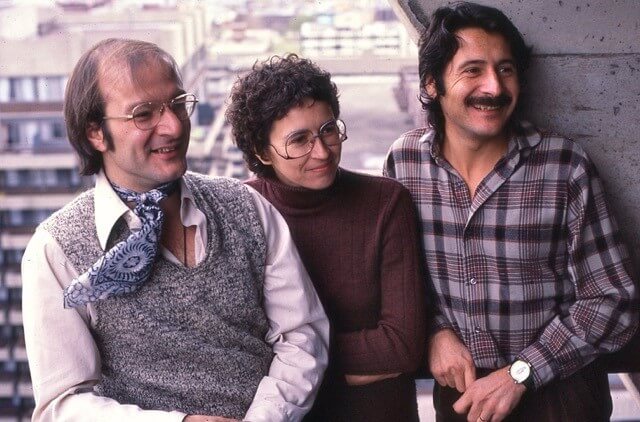Introducing Claude Vivier (Pt.2): a three-part series on the life and works of Claude Vivier by Against the Grain’s Media Attaché, Michael Zarathus-Cook
Against the Grain Theatre will be staging Kopernikus, an opera by Montrealais composer Claude Vivier, from April 4th to 13th. In anticipation of that we are excited to talk to conductor Lorraine Vaillancourt—the premiere conductor of Kopernikus almost 40 years ago—about some of her memories and impressions from her collaborations and friendship with Vivier.
Born in Quebec in 1947, Lorraine Vaillancourt has been a prolific member of Montreal’s contemporary orchestral music scene since the 70’s. Trained as a pianist and conductor at the Conservatoire de musique du Quebec and thereafter in Paris at the Ecole normale de musique, she went on to become the director of University of Montreal’s contemporary music workshop showcasing works ranging from Cage to Stockhausen. She is now the conductor of one of the world’s premier chamber orchestras, Nouvel Ensemble Moderne, which she founded in 1989. Arguably her most unique creation, however, was the result of a collaboration with Vivier:
At 9pm on the ninth day of the month, since 1978 and as late and 1990, a concert society in Montreal produced a performance for avant-garde and contemporary compositions with a mission of “removing barriers between historical periods and musical categories.”. The founding members of the society Les Événements du neuf were an eclectic group of nine, which included Vaillancourt and Vivier. After conducting the premier of Kopernikus on May 9th 1980, she thereafter toured the opera in Montreal and Paris between 1986 and 1989, and was a catalyst to the proliferation of Vivier’s works in the immediate years after his death.
Their relationship dates as early as 1978 when Vaillancourt conducted Vivier’s Chants (1973), a choral work for sevens voices, shortly after they met at the University of Montreal’s Faculty of Music. Recalling the near-instantaneous attraction to his musical sensibilities she describes the short trajectory of collaborations that led to Kopernikus:
I immediately wanted to work on this piece for seven women’s voices that seemed particularly inspired and inspiring to me—and I had a team of thunder! This was when a concert project was born…Friendship and love for music already united Claude and I. This concert, being very well received, was the launch of the concert society “Evenements du neuf”.
At the end of this program, Claude (among others) started his doctoral project (he would study with composer Serge Garant) which was an opera composed specifically for my Atelier and what was then called the “The stage play workshop” (now l’Atelier d’opera) directed by Mrs. Marthe Forget. Thus Kopernikus was conceived in 1979.
Vaillancourt’s body of work throughout the 80’s was especially focused on promoting avant garde compositions that combined historical periods and musical styles, as such Vivier’s penchant for the experimental fringes for voice and ensemble was a welcome opportunity for Vaillancourt. It was the complexity of Vivier’s spiritually adventurous musicality that inspired their collaboration:
Vivier was an enlightened being. The emotion I often felt while directing his music (Chants, Kopernikus, Prologue for a Marco Polo, Wo bist Du Licht) is absolutely unique and I did not find this poetry, this interiority, anywhere else. His influence on me was manifested within our small team of Evenements du Neuf (1976-1988) since we were doing programming collectively. Claude, like all of us, respected his fellow composers and showed the healthiest curiosities about worlds that did not necessarily resemble his own.
From left to right: Claude Vivier, Lorraine Vaillancourt, and José Evangelista
Besides his oddities in socializing—a nervous, raucous laugh and the less than pleasant smell of the biker’s jacket he always wore—Vaillancourt also remembers Vivier for his enthusiasm in connecting a community of creatives in Montreal, albeit his social instincts contended with the solitary spirituality that his music pursued:
Claude Vivier was a star! And his terrible death contributed to his notoriety. We can only imagine everything he could have still given us. Claude was also a beloved and much appreciated person in Montreal. His network of acquaintances and friends was immense. He considered the premiere of his opera an event not to be missed, and he took charge of filling the National Monument Hall. Claude had a kind of faith in his music that was rather touching, and what might have seemed pretentious in someone else was actually a gesture of love.
She added, in the same breath, a reminder of the importance of staging Canadian opera in Canada, and the significance of small opera companies to the growth and relevance of the operatic repertoire…
Today there are many operas “resolutely modern” and that are still quite interesting. If we do not have more audiences this is due to the reluctance of the big boxes that are the major opera houses. Just because we program an opera that is composed in 2019 does not mean we are contributing to enriching the repertoire: we often have to deal with voiceless music, writing that is very conformist and academic, without being interesting … just a good show! The presence of an open, curious and stated artistic direction makes all the difference. Toronto, among others, has dared to create beautiful creations and should serve as an example.
Lorraine Vaillancourt is the current Musical Director of Nouvel Ensemble Moderne, and has been an advocate for the production of Vivier’s works in Canada and abroad, since the year of his death.
—
Article by Michael Zarathus-Cook, Against the Grain’s Media Attaché
To purchase tickets to Against the Grain’s Kopernikus (April 4 – 13) click here.

